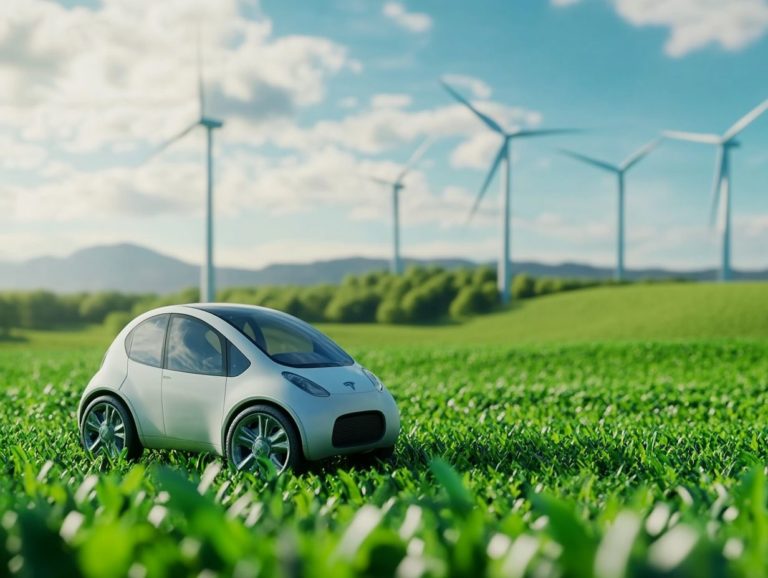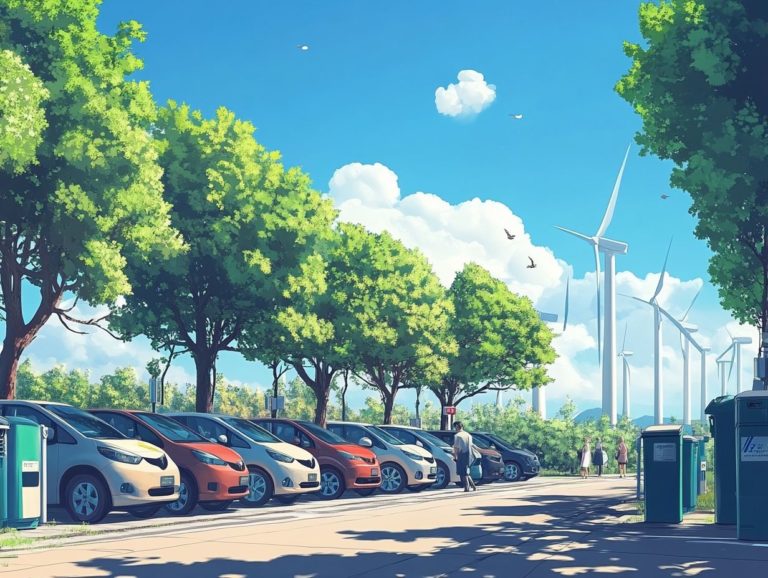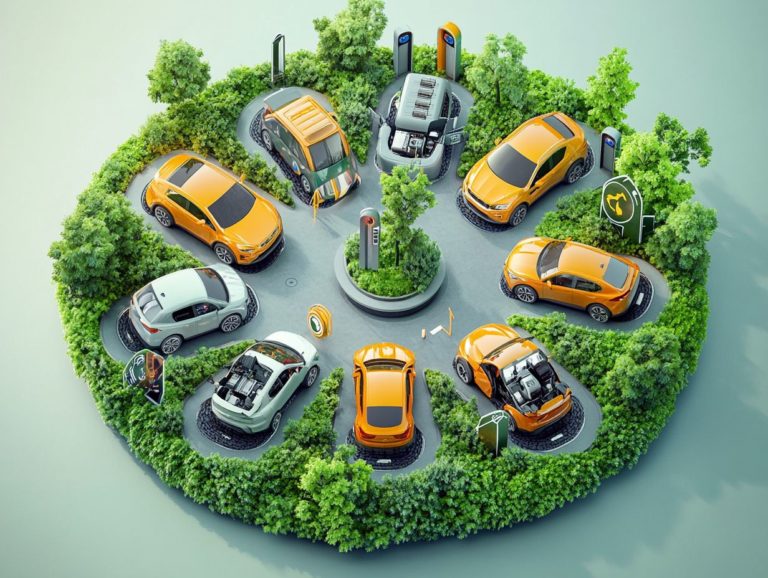5 Sustainable Practices for EV Owners
As electric vehicles (EVs) become the new norm, it s essential for you to focus on maximizing their positive impact on the environment.
This article delves into five sustainable practices that you can easily adopt, from charging with renewable energy sources to making the most of public charging stations.
You’ll learn about the lifecycle of your vehicle, how to recycle battery components, and the merits of efficient driving habits.
Implementing these strategies not only boosts your eco-friendly credentials but also contributes to a greener future.
Curious about the larger implications of owning an EV? Keep reading to uncover how you can further reduce your carbon footprint and navigate the challenges that accompany the electric mobility landscape.
Contents
- Key Takeaways:
- 1. Charge Your EV with Renewable Energy
- 2. Utilize Public Charging Stations
- 3. Practice Efficient Driving Habits
- 4. Recycle and Properly Dispose of Batteries
- 5. Consider the Lifecycle of Your EV
- How Do Electric Vehicles Impact the Environment?
- Frequently Asked Questions
- What are the top 5 sustainable practices for EV owners?
- Why is using renewable energy important for EV owners?
- How can EV owners drive efficiently to conserve battery life?
- Is it important to recycle old EV batteries?
- Why should EV owners consider using public transportation or sharing rides?
- What is the proper way to dispose of EV batteries?
Key Takeaways:
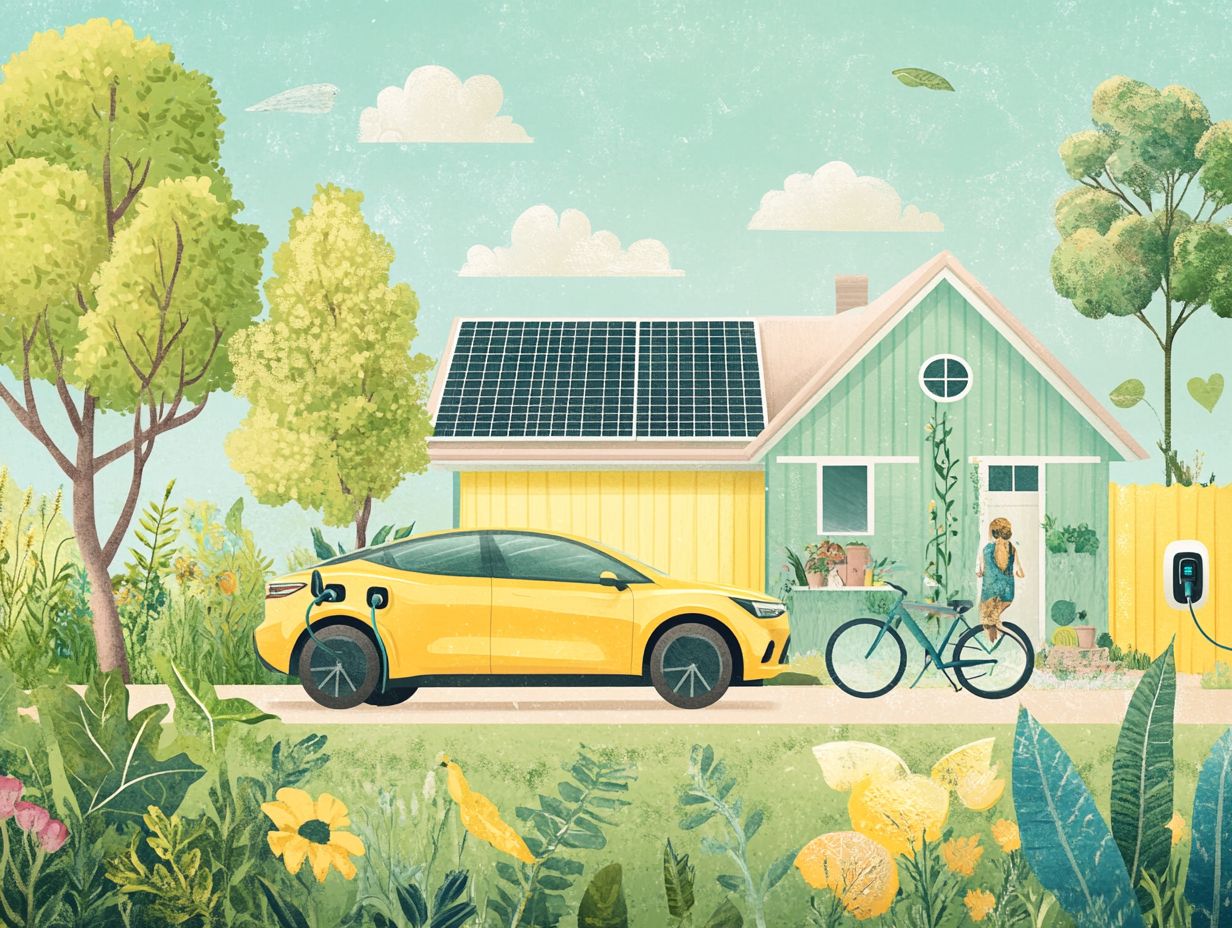
- Power your EV with clean energy and watch your carbon footprint shrink!
- Utilize public charging stations to conserve energy and support renewable energy infrastructure.
- Practice efficient driving habits like avoiding aggressive acceleration and braking to increase your EV’s range and decrease energy consumption.
1. Charge Your EV with Renewable Energy
Charging your electric vehicle (EV) with renewable energy sources is a crucial step in your journey to reduce greenhouse gases (harmful gases that trap heat in the atmosphere) and combat climate change. To enhance your experience as an EV owner, consider the 5 tools every EV owner should have. This is your chance to shape a sustainable future in the automotive industry!
Embracing cleaner energy solutions means integrating solar, wind, and other renewable sources. This approach significantly minimizes the environmental impact of charging EV batteries and aligns perfectly with the best EV maintenance practices for families championed by top automotive manufacturers and conscious consumers like yourself.
Consider harnessing solar panels, which allow you to tap into an abundant and clean resource. Whether installed on your rooftop or within dedicated solar farms, these panels generate electricity that can directly power your EV or contribute to the grid.
Wind turbines also present an effective means of energy production, especially in breezy locales. Their integration into a smart grid a system that uses technology to improve the reliability and efficiency of electricity distribution enables real-time energy distribution.
Get inspired by pioneers like Tesla, who are leading the charge by equipping their Supercharger stations with solar installations. General Motors is also exploring partnerships to weave wind energy into their EV charging infrastructure.
This collaboration promotes renewable energy growth while enhancing the overall efficiency and sustainability of electric vehicle charging, enabling you to make a positive impact with every charge.
2. Utilize Public Charging Stations
Utilizing public charging stations is vital for the widespread adoption of electric vehicles (EVs). These stations provide convenient and accessible options for drivers on the go, significantly enhancing consumer adoption rates.
Places where you can charge your EV are crucial in supporting the infrastructure necessary for a smarter, more sustainable energy grid. Take Zomato’s initiatives; by implementing charging points at various locations, they not only promote EV use but also contribute meaningfully to the smart grid, optimizing energy distribution during peak hours.
Fast charging technologies further bolster this infrastructure, allowing EVs to replenish their batteries in a fraction of the time compared to traditional methods. This convenience alleviates range anxiety, making it much easier for individuals to transition to EVs and embrace a greener lifestyle.
Start today and join the movement towards a cleaner, greener world!
3. Practice Efficient Driving Habits
Practicing efficient driving habits can yield significant savings in battery life and energy consumption for electric vehicles (EVs). This not only reduces carbon emissions but also enhances the sustainability of personal transportation.
By focusing on smooth acceleration and gentle braking, you can maximize your EV’s ability to recharge while driving, allowing kinetic energy to transform back into stored energy in the battery. This technique extends your driving range and makes your experience quieter and more comfortable on the road.
Electric motors deliver power instantly, unlike traditional internal combustion engines that take time to ramp up. By understanding these differences and adapting your driving style, you can minimize energy waste and significantly decrease the environmental impact of your vehicle. This approach makes driving more cost-effective and positions you as a greener choice in today s world.
4. Recycle and Properly Dispose of Batteries
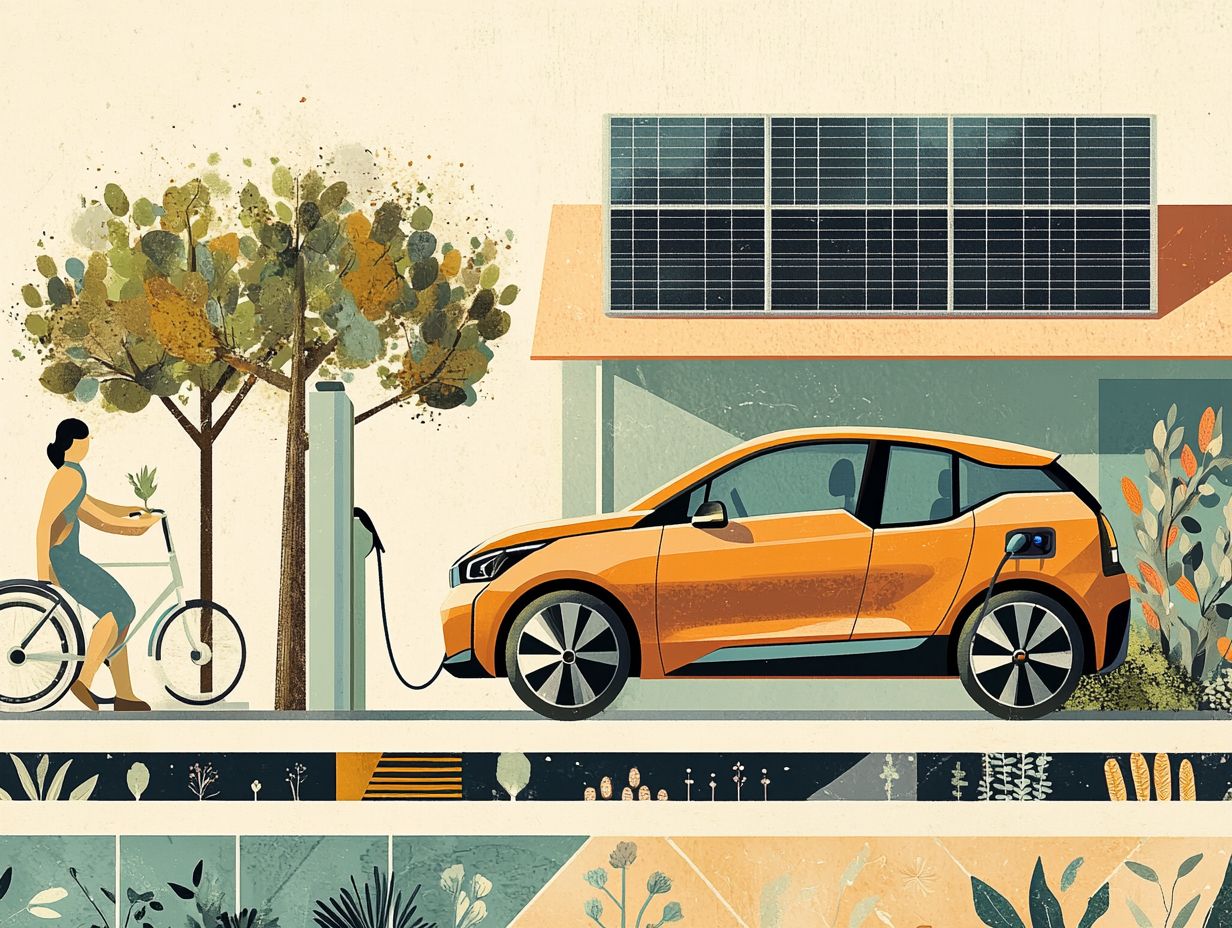
Recycling and properly disposing of EV batteries is essential for promoting environmental sustainability and mitigating the harmful effects of batteries used in electric cars on our environment.
As electric vehicles become popular, we need better recycling methods. It s crucial that valuable materials are reclaimed instead of allowed to sit in landfills. Companies like Lohum Cleantech and Raptee, which recycle electric vehicle batteries, are leading this movement with innovative methods to safely and efficiently recycle batteries.
By reprocessing materials such as lithium, nickel, and cobalt, these companies minimize waste and conserve finite resources, which is vital for meeting future energy demands. Enhanced recycling initiatives also play a significant role in reducing the environmental footprint. By doing this, we can create a closed-loop system that protects our planet now and for future generations.
5. Consider the Lifecycle of Your EV
Considering the lifecycle of your electric vehicle (EV) is vital for understanding its environmental impact, from the initial manufacturing processes to its eventual disposal. Learning how to evaluate sustainable practices in EVs helps you practice sustainability with your EV.
Your journey begins with the extraction of raw materials. It s important to sourcing ethically and sustainably to minimize harm to the environment. Manufacturers strive to reduce their ecological footprint by using recycled materials and eco-friendly alternatives whenever possible.
As your vehicle transitions from production to your hands, focus shifts to its energy efficiency and emissions during operation. The end-of-life phase is equally important; automotive companies are investing in advanced recycling technologies and programs designed to minimize waste and recover valuable materials. This creates a closed-loop system that lessens the overall environmental burden.
How Do Electric Vehicles Impact the Environment?
Electric vehicles (EVs) have a remarkable impact on the environment, allowing you to reduce carbon emissions and promote sustainability. They present a cleaner alternative to traditional combustion engines, which have long contributed to climate change.
According to research from the Berkeley Law Center, transitioning to EVs can cut greenhouse gas emissions by up to 50% compared to gasoline-powered vehicles, especially when you charge them with renewable energy sources. This shift diminishes your reliance on fossil fuels and improves air quality in urban areas, leading to enhanced public health outcomes.
As more cities adopt policies to promote EV usage, the collective impact can significantly slow the progression of climate change. Join the movement for a more sustainable future for generations to come.
What Are the Benefits of Owning an EV?
Owning an electric vehicle (EV) offers many undeniable benefits, such as reducing your carbon footprint and using clean energy. Additionally, you can explore 5 ways EVs support sustainable development goals while enjoying lower operating costs.
In addition to their environmental benefits, EVs offer significant savings on fuel. Electricity is often cheaper than gasoline. You may also find that maintenance costs are lower due to fewer moving parts and less wear and tear compared to traditional vehicles.
Government incentives, such as rebates and tax credits, also make the initial investment more manageable. Many drivers also feel great satisfaction in knowing they are contributing to a more sustainable future, preserving the planet for generations to come.
What Are the Different Types of EVs Available?
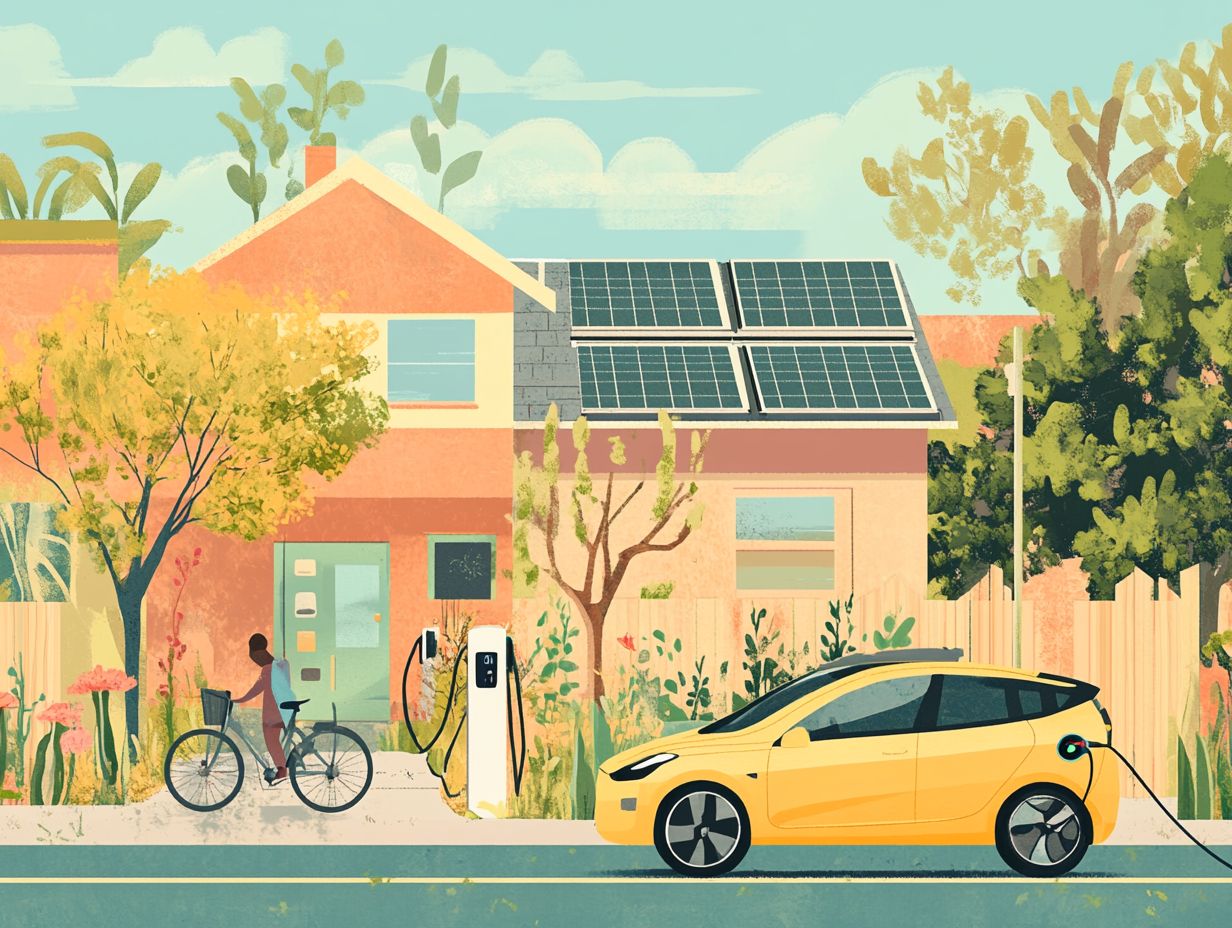
You ll find various electric vehicles (EVs) on the market today, including battery electric vehicles (BEVs), plug-in hybrids (PHEVs), and hybrid electric vehicles (HEVs). Each type provides unique benefits and driving experiences.
BEVs, like Tesla s Model 3, offer zero tailpipe emissions and impressive long-range capabilities. On the other hand, PHEVs, like the Chevrolet Volt from General Motors, combine electric driving with gasoline backup for longer journeys.
If you want fuel efficiency without the hassle of external charging, HEVs, such as those from Volvo, seamlessly integrate gasoline and electric power. Each type allows you to choose what aligns with your lifestyle, environmental values, and driving preferences.
How Can EV Owners Reduce Their Carbon Footprint Even Further?
As an EV owner, you can significantly reduce your carbon footprint by embracing sustainable practices. Start using renewable energy to charge your EV today. Additionally, follow the best practices for maintaining your EV, optimize your driving habits, and get involved in battery recycling programs.
By installing a home solar system, you can harness the sun s energy to charge your vehicle, drastically reducing reliance on fossil fuels. Joining eco-friendly communities can also be incredibly beneficial. You ll find valuable resources and support from members who share tips that lead to smarter, greener choices.
Participating in local recycling initiatives ensures the responsible disposal of old batteries and parts. It also fosters a culture of sustainability within your community. Engaging in these practices enhances your personal accountability and contributes to a larger environmental movement.
What Are the Challenges of Owning an EV?
Owning an electric vehicle (EV) does come with its challenges. You might encounter limited charging infrastructure, concerns about battery life, and higher upfront costs compared to traditional vehicles.
For many potential owners, the availability of charging stations is a common source of anxiety, especially in rural areas or along less-traveled highways. This can hinder the convenience of long-distance travel. Range anxiety the fear of running out of battery before reaching a charging point adds complexity to the decision to transition to EVs. Maintenance can also feel overwhelming if specialized services are not easily accessible.
However, advancements in technology, such as fast-charging networks and enhanced battery efficiency, are being developed to address these challenges. Additionally, incentives and policies aimed at expanding charging infrastructure encourage more consumers to embrace electric driving, making the transition smoother and more appealing.
How Can Governments and Companies Encourage More Sustainable EV Practices?
Governments and companies play a crucial role in promoting sustainable practices in the electric vehicle (EV) market. They implement policies, offer incentives, and introduce innovative technologies to facilitate widespread adoption.
Many governments are rolling out tax credits and subsidies to lower the purchase price of electric vehicles. This makes EVs more accessible to everyday consumers. Such strategic moves help ease the initial financial burden and boost overall market demand.
Car makers are investing heavily in research and development to advance battery technologies and enhance vehicle efficiency. This shows their commitment to eco-friendly practices.
By collaborating with governments and embracing sustainable strategies, these companies are driving innovation while positioning themselves as frontrunners in an increasingly competitive and environmentally conscious landscape.
Frequently Asked Questions
Here are some common questions about sustainable practices for EV owners:
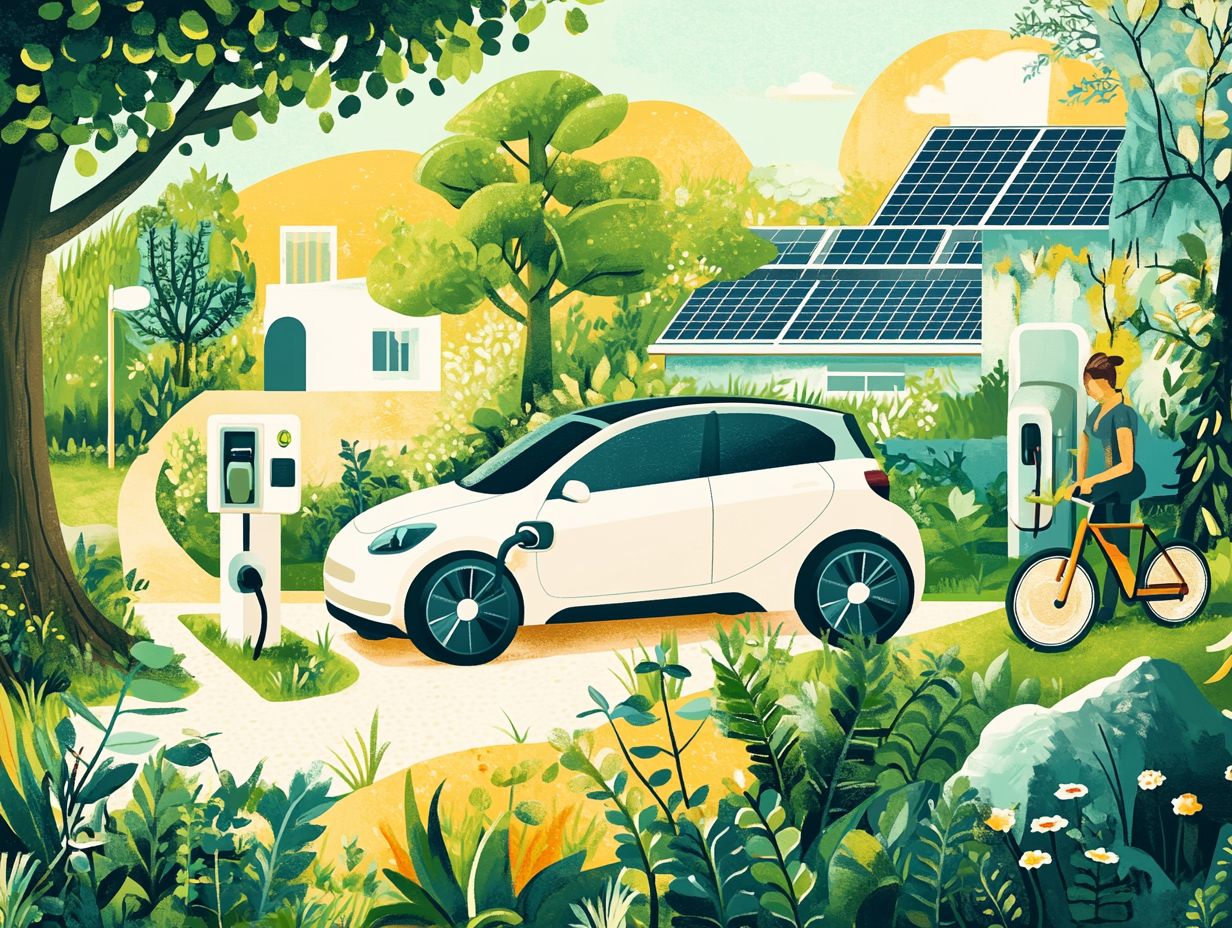
What are the top 5 sustainable practices for EV owners?
The top 5 sustainable practices for EV owners include:
- Using renewable energy to charge their vehicles.
- Driving efficiently to conserve battery life.
- Recycling old EV batteries.
- Utilizing public transportation or sharing rides whenever possible.
- Properly disposing of EV batteries.
Why is using renewable energy important for EV owners?
Using renewable energy, like solar or wind power, to charge EVs helps reduce our reliance on fossil fuels. It also decreases carbon emissions over time and makes charging more cost-effective.
How can EV owners drive efficiently to conserve battery life?
EV owners can drive efficiently by using a system that helps recharge the battery when slowing down. Additionally, following 5 ways to keep your EV running smoothly and maintaining a steady speed helps avoid frequent acceleration and deceleration, which saves battery life.
Is it important to recycle old EV batteries?
Absolutely! Recycling old EV batteries prevents harmful chemicals and materials from polluting our environment. It also allows for the recovery of valuable materials, minimizing the need for new resource extraction.
Why should EV owners consider using public transportation or sharing rides?
Why not hop on a bus or share a ride? It’s a fun way to help the planet and save money! Using public transportation or shared rides reduces the overall carbon footprint and can also lower fuel costs for EV owners.
What is the proper way to dispose of EV batteries?
EV owners should take old batteries to designated recycling centers or use manufacturer take-back programs. Following proper disposal procedures is crucial to prevent environmental contamination and ensure the safe handling of hazardous materials.
Join the movement for a greener future! Explore how you can implement these sustainable practices today!

